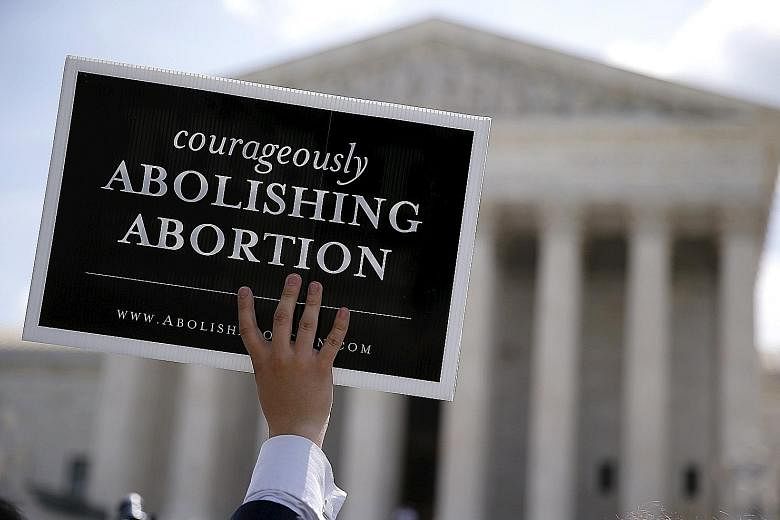WASHINGTON • The US Supreme Court hears its most important abortion case in decades today, with all eyes on the critical swing vote of Justice Anthony Kennedy.
The case has huge implications that could determine the availability of abortion services across the United States, just as a highly polarised electorate goes to the polls in this election year.
But the sudden death of conservative Justice Antonin Scalia could complicate the outcome of the high-stakes debate. The vacancy on the nine-seat Supreme Court bench leaves the court evenly split 4-4 between conservatives and liberals.
If the liberal justices fail to swing Justice Kennedy to their side, a lower court decision that ended up before the Supreme Court will be upheld, in this case meaning a restrictive Texan law would stay in place.
The vote of Justice Kennedy, who helped draft a ruling 24 years ago that reaffirmed a woman's right to abortion and said any state restrictions could not impose an "undue burden" to that right, is thus critical.
The Texan bid is part of a series of conservative efforts seeking to challenge the historic Roe v. Wade Supreme Court ruling that legalised abortion in 1973.
The 2013 Texas law at the heart of the case imposes restrictions on abortion clinics so rigorous that activists say they could force 75 per cent of them to go out of business.
That would leave just 10 abortion clinics in the state. As a result, hundreds of thousands of women are having or will have to seek abortion services far from their homes, and face a weeks-long wait.
Under the law, doctors who perform abortions must have admitting privileges at nearby hospitals and the clinics must meet the standards of an ambulatory surgical centre, a medical facility for low-risk surgery.
Backers of the law say it aims to protect women's health.
However, critics say that is a pretext to have the landmark abortion ruling Roe v Wade overturned.
"I am highly sceptical of the claims that these measures are intended to safeguard women's health," said Professor Sherry Colb of Cornell Law School.
"This case is so important nationwide because some of the opponents of the right to abortion have enacted and are trying to enact similar laws in other states," said attorney Michael Dell, who represents women who had abortions.
More than 110 female lawyers and other women in the legal profession filed supporting briefs largely aimed at Justice Kennedy in which they described how their abortions allowed them to plan for their subsequent professional and family lives.
"To the world, I am an attorney who had an abortion, and, to myself, I am an attorney because I had an abortion," read an e-mail from one.
But Mr Allan Parker, a lawyer with anti-abortion group the Justice Foundation, said the briefs may only alienate Justice Kennedy.
"The abortion industry is trying to make it sound like abortion is a joyful experience," he said. "But even women who say it was necessary say it was not joyful. It is a grief and a blackness, and it changes you."
From 2011 to 2014, US states adopted no fewer than 231 new abortion restrictions, according to the Guttmacher Institute, which tracks abortion policy. The number of states considered hostile to abortion rights more than doubled from 13 in 2000 to 27 in 2014.
AGENCE FRANCE-PRESSE, NEW YORK TIMES

